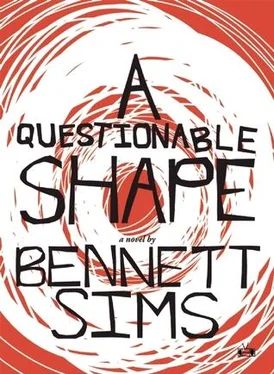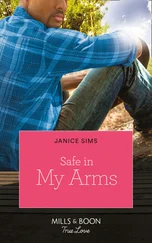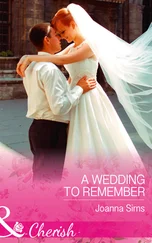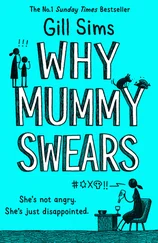If she were just returning to a tree house or childhood idyll that she’d never thought to tell me about, or a gymnasium where, a decade ago, she practiced some sport I didn’t know she played, I might not mind so much having to find her there. But what if the site she returns to is the bedroom of a high-school sweetheart, a guy she dated even longer than she’s been dating me, and whose memory — despite her having never mentioned it — she’s apparently been cherishing the entire time we’ve been living together? Imagine if he were the secret love of her life, whose loss she’s never recovered from. What if she self-identifies more deeply as this other guy’s lover than as mine? 44What if his bedroom is on her list right now, one of the ten extra entries from her promiscuous memory? What if he is her paramour from the past tense, cuckolding me from her unconscious, such that her body will break up with me in undeath, leaving our apartment for him ? Am I supposed to just stand vigil outside his bedroom, waiting for my moonstruck undead lover to shuffle back? But it wouldn’t even be ‘my’ lover who was shuffling there! The Rachel I’m dating, the ‘you’ I mean when I tell her ‘I love you,’ the self she’s constructed as a backdrop for me to project my love on, has never so much as mentioned this adolescent passion. Its memory isn’t included in the version of her I love. His name has never even come up in conversation between us. Where I’m concerned, she never dated the guy. So if Rachel returns to him when reanimated, it means that undeath has set her clock back: not my Rachel, but some decade-ago Rachel, a high-school Rachel, a beta Rachel 45who is this guy’s lover and (more to the point) this guy’s responsibility. If, in undeath, it’s Michael Furey whom her unconscious is oriented toward, then let Michael Furey go looking for her, is what I’m tempted to say, when I think about it.
But before I can say anything, Rachel clears her throat, preparing to read from her list. And in the moment before she begins, I realize how dangerous I’ve allowed my anxiety to become. I’m investing entirely too much emotion into these sites. For if I would be heartbroken to find Rachel at Michael Furey’s, how might I feel to find her on the campus lawn? To see her kneeling in the grass, as if in search of the little leaf? Surely I would be overcome with love for her all over again. And in that case, who knows what I would do? I might even make the fatal mistake of hugging her. Nor is there any doubt that Rachel — if she were to find me there — would be doomed: that joyous context would prime her to see me as alive. Clearly neither of us is prepared to encounter the other in undeath, not psychologically, not emotionally. Soon, I decide. It will have to be soon. We’ll have to do the defamiliarization exercises.
Rachel looks up at me now, with a conspiratorial grin. As she starts to read from her list, I lean over and see that she’s beginning from the top, with the very first site she wrote down today: ‘The campus lawn,’ she says.
WHEN MATT AND I ARRIVE AT MR. MAZOCH’S THIS morning, the front of the house is damaged. There’s a beige dent of chipped wood in the door, and two of the windows have been shattered. It appears as if someone tried — and failed — to get inside. Looking at the gaping holes in the windowpanes, the jutting stalagmites of jagged glass, I’m too shocked at first to know how to react. Matt’s reaction is unequivocal. ‘Shit,’ he whistles. ‘Do you believe that?’ When he turns to me, his face is expressionless. ‘He came back.’
As a matter of fact, I do not believe it. Matt is already unbuckling his seatbelt to go inside. But before he can leave I ask him who he thinks ‘he’ is, exactly. ‘I don’t know,’ he admits. ‘I don’t want to jump to conclusions. But why couldn’t it have been him?’ I bite my tongue. ‘You’re not going into the house again?’ I ask him. ‘For the third day in a row?’ ‘Mike,’ he says. I study the windows, still unsure what to make of them. They don’t seem low enough for an infected to crawl through. And they’re too haphazardly shattered — their panes still too intact — to have admitted a human body. Matt shakes his head. ‘The house has been vandalized,’ he says.
Though I do not go so far as to accuse Mazoch of breaking those windows himself (of coming here last night, bat in hand, and swinging into them as he did at the antiques mall, then denting the door for good measure), the possibility has not escaped my notice. Even if Mr. Mazoch would ever damage his own property like this, his sense of timing really does strain credulity. After I’ve dismissed the other ‘traces’? 46Two days before the deadline? I do not say this to Matt’s face, of course. I simply ask him to walk me through his logic. ‘Tell me why,’ I tell him. ‘Why the systematic destruction of property? Why march up and down the front of the house, punching holes in windowpanes, instead of just breaking in through a single entrance? That’s not how they behave.’
This is actually a question I’ve devoted a considerable amount of thought to, even before this morning. If we were to ever find Mr. Mazoch here — I have often asked myself — what might he be doing? How would he be behaving? I have pictured him in countless scenarios: fumbling with the knob of his locked front door; dragging a rake behind him in the driveway; standing in the yard with a plunger, pumping dumbly at the grass. But never punching his own windows. And in fact, the more that I try to imagine it, the more difficult it is. He would remember that this was his house. Before he could shatter his window, some memory in the hand would stay his hand. The recognition would be as much a matter of muscle memory as of reasoning, engrained as deeply in his hand as in his head. Only if he saw fresh meat beyond the windowpane, some victim on the other side, would his instinct to feed override his hand.
That is one of the few aspects of undeath that I feel certain about. In addition to their homing instinct, it is clear to me that they have something like equipment memory, a residue of know-how in their hands. Every night I watch them on the news, operating tools from their mortal lives: pushing a shopping cart down a grocery-store aisle, lamely striking at a tree with a hammer. Their faces are vacant, and it’s evident that they don’t quite know what they’re doing. But the hand knows: it is seeking a handle, gripping at instruments from its former life. The hand remembers what the head does not. 47Whenever I see an infected swinging a hammer, I am convinced that some memory of carpentry is compelling it to: the feel of polished wood, a familiar heft in the palm, a range of motion — at least this (and who can say what else?) persists in the hand. 48Even if an infected cannot see, or is seeing into some other world, its body still goes about its business in this world. The hand maneuvers the shopping cart around obstacles, it hits its target with the hammer. It is operating purely by memory. 49
That is one of the questions I have to ask myself, when I ask myself what it would be like to be undead. Not only what and whether I would see; not only which sites my body would return to… but also what my hands would do. How they would behave. Coursing through them — filling them to the tips of their fingers, like the faucet water that engorges a latex glove — must be all the habits and motions that they serve as the phenomenological repositories of. They could never really cease being my hands. I try to picture them on my undead body, compelling it to perform some echt gesture from my mortal life: cradling Rachel’s face; massaging my eyeballs; buttering toast. They would do whatever I’d done with them — whatever I’d taught them to — beforehand. They would be before-hands. And so they would never adopt new habits, in undeath. They would not try to play the piano, for instance, or to casually vandalize my apartment. Even if they did things that I never did with them (like tear into another person’s flesh), they would do them somewhat in my manner : ripping into the meat in the same way that, at barbeques, they used to rip into ribs.
Читать дальше












